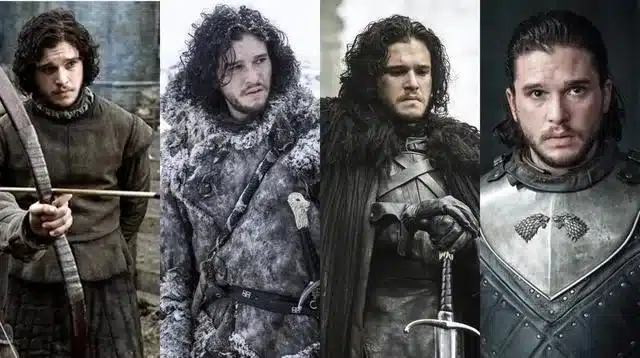
Find out why readers have been so critical and harsh on Kit Harington’s character since the HBO series began
Jon Snow, a name that conjures up images of heroic battles and civil strife, embodies a saga of growth and conflict in both George R.R. Martin’s “A Song of Ice and Fire” books and HBO’s “Game of Thrones” television adaptation. However, these two versions of the character went in radically different directions. The television series, despite its great success, was criticized for its simplified portrayal of Jon Snow, a complex and ambiguous character in the original narrative.

Between a rock and a hard place
Kit Harington, who played Jon Snow, stepped into a role that resonated with millions, preaching equal parts and showing conflict. But in the face of such a talented warrior, has the series been able to capture the essence of the character? The response, shrouded in debate and controversy, is a huge disappointment among the book’s readers.
As the series built on its own success, the character’s portrayal drifted further and further away from his literary counterpart. Readers meet John as a teenager, emotional and complex, constantly growing. On the other hand, the television adaptation presented a more mature and physically demanding John, but he lacked the depth and inner conflict that characterizes the character in the books.
Simplify the hero
The series, while it had its wonderful moments, failed to capture the complexity of the Bastard of Winterfell. Kit Harington did his best with the material presented, but the script limited his character to more of a physical warrior than a thoughtful, strategic leader. The challenges of adapting such an inner character remain unsolved, and with it, the opportunity to explore a more accurate and complex John Snow is lost.
In the books, the character faces moral dilemmas and loyalty conflicts that shape his character. These elements are important for his development, but in the series, his evolution, the character experiences in the main narrative is left without the depth and evolution.


A fictional character, but well interpreted
Jon Snow became a cultural icon thanks to the series, but this popularity came at a cost. His character, instead of being a true reflection of Martin’s vision, became a shadow of what he could have been. The series, by prioritizing visual drama and action over character development, misses an opportunity to delve into complexity and nuance.
Despite the efforts of Kit Harington and a talented production team, the TV adaptation differs greatly from Martin’s original vision. Fans of the books and the series continue to debate the authenticity and depth of the character in both versions. Martin’s Jon Snow is a character study, a young man struggling with his identity and his place in a hostile world, while the series offers a lighter, less visceral version.
The road is not taken.
John of the books faces dilemmas that define his character, and his evolution is a journey of self-discovery and maturity. The series, however, reduces these aspects, presenting a slightly more complex and dynamic character. This difference affects not only the perception of the character, but also the entire narrative of the series.
The TV adaptation had the opportunity to explore a more complex and nuanced character, but chose a different path. This simplistic approach left many viewers and readers feeling like an empty potential, an iconic character not fully realized.


The legacy of Jon Snow
Despite these differences, John remains the main character in both the books and the series. His story continues to resonate with fans, and his legacy as one of the most fascinating and controversial characters in the Martin saga remains intact.
His portrayal in the series may be different from Martin’s original vision, but his influence on popular culture is undeniable. As long as fans continue to debate and scrutinize his character, Jon Snow will continue to be a testament to the power of storytelling on the page and on screen.